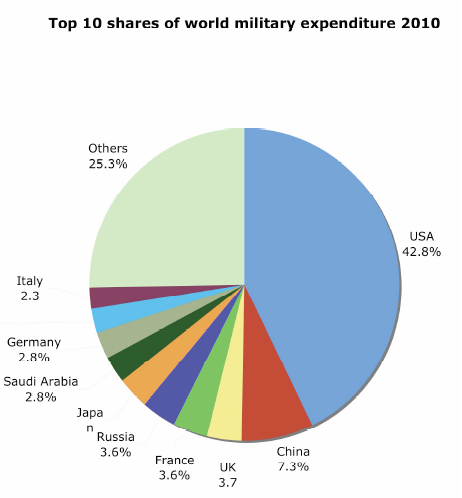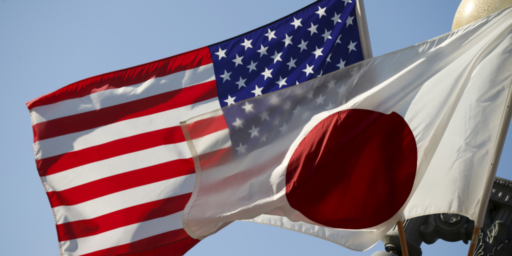U.S. Military Spending v. The Rest Of The World
Via Think Progress and this report, I found this chart:
 Now I think we can draw a few conclusions from this information:
Now I think we can draw a few conclusions from this information:
- There is no nation on the planet that poses a real threat to the United States in the way that the USSR during the Cold War. Russia’s share of worldwide military spending is less than the United Kingdom’s and equal to that France. Our military spending is six times larger than that of China. That’s not to say that there aren’t threats out there, but the idea of any nation posing existential threat to the United States is, I think, off the table
- Our allies (the U.K., France, Saudi Arabia, Germany, Japan, and the vast number of nations that make up “Other”) can afford to pay more toward their own defense than they are now.
- We could afford to make serious cuts in our defense budget without threatening our own security.





Is this the new example of ‘throwing money at the problem’?
Let me preface my remarks by reminding everybody that I’m in favor of substantial cuts in U. S. defense spending. However,
1. There’s more to defend than just against attack on the U. S. homeland. We’re also defending an entire system of trade. Saying that the Chinese, Russians, or whoever should bear more of the costs of defending that system also means we’ll have less say in the structure of that system.
2. Other countries can spend less because we spend more. You may recall that the U. S. took the early initiative in Libya due to “unique U. S. capabilities”. Saying that we should have a lot less excess capacity means that either a) we shouldn’t have gotten involved in Libya or b) you think that somebody else should have excess capacity (if they do and we don’t that changes the equation quite a bit) or c) you think that the operation should have been done without “unique U. S. capabilities”.
I suggest you try to “norm” DOD’s expenditures against the other countries, especially China’s.
First, the DOD budget is packed with pork that Congress critters tack onto it that have nothing to do with national defense. Sen. Byrd was the master of this. So strip those budget lines out (if it is even possible to identify them all).
Second, compare personnel costs. These include pay, allowances and contracted services, which in 2007 accounted for for almost one-third of the whole DOD budget. This is magnitudes greater than our competitor countries, which fund practically no family services in the defense budgets. As well, the American military individual is the highest-paid in the world. This goes along with having a volunteer, professional force, which most other countries don’t have, but still it should be normed to make the comparison apt.
Finally, an enormous proportion of the US defense budget actually pays defense costs of many other countries, especially in Europe and some of the Far East such as Japan and South Korea. How much would it cost those countries to reimburse us for what we are spending to pay for their defense? I doubt anyone knows, but basically many countries have out-sourced much of their defense to us. See, for example, by 2008 essay, “What has NATO done for us?”
This is why just comparing dollars is not informative. Just consider petroleum fuel costs alone. We spend billions of dollars providing heavy lift by air and sea for other countries – just consider the Japan relief effort. The Air Force is the largest consumer of petroleum fuel in the US, and an enormous amount of this fuel is burned directly supporting other countries. Then consider that Saudi Arabia, for example, produces its own oil and so its fuelk costs are a small fraction of ours. Shouldn’t all this be normed?
It would be a good time for Pres. Obama to ask for a line item veto go guard against all the pork that load up the budget. The GOP was all for it when GWB was in the WH. Let’s see what tune they sing now.
Well, we really have no idea how much China spends on it’s military. Those figures are basically guesses.
Also, just to lend some perspective, we will spend $151 billion just in pay and benefits for military personnel which is about what France and the UK spend on their entire military combined.
All that spending buys a lot of capability – rather than look at the cost and simply declare that it’s too big, we need to look more fundamentally at US foreign policy and the American military’s role in it. For example, despite the fact that most NATO countries are right next door to Libya, the Europeans still required our military assistance for this Libyan intervention. The ability to establish a NFZ thousands of miles from the US in under 48 hours does not come cheap. As someone who has spend almost 18 years in the service I do question whether we need that capability and I’m concerned that our European allies, in particular, are too reliant on our unique capabilities.
Also, I wonder how liberal interventionists reconcile their desire for more “humanitarian” military interventions with a greatly reduced military budget.
Other countries, including China, also use the military as an employment sink, to help make sure everyone has a job. I’m sure there are millions in the ranks with essentially no operational readiness.
Oh, note that we could use the military as more of an employment sink ourselves, if we had national healthcare, and the old-age care of so many millions were not “booked against” military budgets.
@john personna – For the last decade or so, the PLA has been shedding a lot of those “make work” military positions and have been downsizing to a semi-professional force and at the same time improving its weaponry and combat capabilities.
What about Russia?
Same thing. Ground forces has been drastically cut from the days of USSR. Also on a trend towards professionalization.
Not to mention a police force. Many of the world’s countries don’t have the ability to project power because the purpose of their militaries is regime preservation. That requires a substantially different military than one capable of projecting power does.
Hey, I’m all for cutting the defense budget, i just don’t want to hear all the whining about Responsibility to Protect (R2P) and intervening in distant civil wars. The ability of the UN to, well, do anything that requires competent force, goes out the window. Same with NATO, as we see, they have troubles operating from US bases to bomb a country with no air defenses just a hop across the mill pond.
If it doesn’t directly contribute to the US projecting forces onto enemies anywhere in the globe, then we don’t need it. Of course, that leaves out most of the latest Democrat presidents’ doctrines where we involved ourselves in conflicts that did not directly tie to US national security: Kosovo, Somalia, Libya…
We are pricing ourselves out of going to war. It takes about a million dollars a year to put a soldier in Afghanistan. It cost us $50 million for each Taliban fighter we kill.
http://www.informationclearinghouse.info/article26521.htm
All this for a war that is proving to be unwinable. I think the last person to win in Afghanistan was Genghis Khan in 1220
China has little interest in being a global power. The thrust of their military is to be the regional power in East Asia.
SH: anything that keeps us out of Libya is OK with me.
Or perhaps Iraq, where the cost in in American lives & national treasure exceeded Kosovo, Somalia, and Libya by orders of magnitude…
Let’s not forget Truman and the Korean war or JFK in Vietnam.